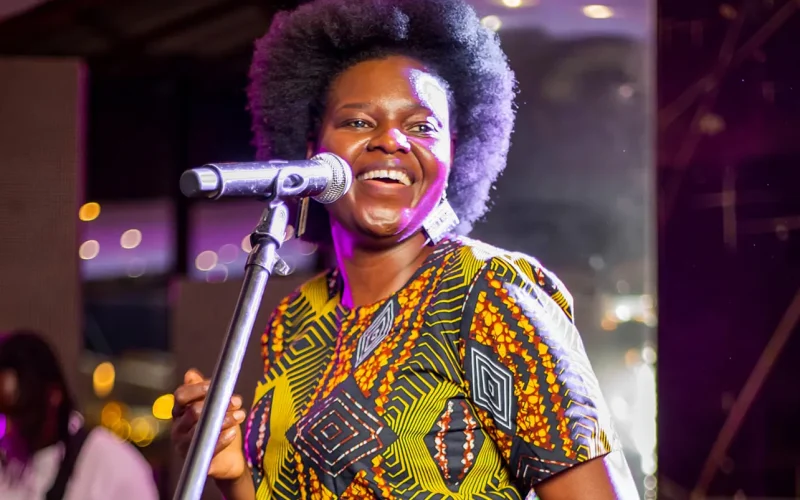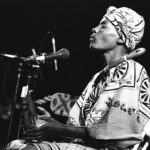AT the age of ten, Selmor Mtukudzi accompanied her father to her first studio recording. By then, Oliver Mtukudzi was a household name all over Africa and known fondly worldwide by his fans as ‘Tuku’.
Today, Oliver Mtukudzi is considered an icon among the continent’s club of artistic heroes; he addressed social issues as a musician and actor and acted as a goodwill ambassador for the UN’s children’s fund. He also mentored young musicians, including his own children.
His career spanned over four decades until his death in January 2019. Now, Selmor and others in the Mtukudzi family are working to continue his legacy in their own ways.
“Growing up in a musical household, I was immersed in the rich heritage of Zimbabwean music. My father’s melodies, rhythms, and soulful lyrics resonated with me from an early age. His commitment to authenticity and storytelling left an indelible mark on my creative spirit,” Mtukudzi said.
Singing mainly in the Shona language, like her father, Mtukudzi’s debut album, “Shungu” was released in 2008, followed by two joint albums, alongside her husband Tendai Manatsa. Mtukudzi’s most iconic song is “Nguva Yangu” which has a million views on YouTube. The heartfelt track, released in 2013, reflects on love, memories, and the passage of time.
One of her songs, “Zvidikidiki” from her 2015 5th album “I Am Woman” won two awards out of the four she was nominated for. That same year, she joined eight prominent African female singers, including South African singer Judith Sephuma and Nigerian hitmaker Yemi Alade, to campaign for world leaders to tackle poverty by addressing gender inequality.
In 2011, before her father’s absence, Selmor joined forces with her sister, Sandra, to bring their version of Tuku Music to the stage. The two siblings entertained fans with Mtukudzi’s yesteryear popular tunes and signature moves. They worked together until Sandra’s relocation to the UK at the end of 2023.
“I have worked with my sister Sandra since 2011 as both my manager and backing vocalist. Last year, she moved to the UK permanently. So, we don’t work together anymore. But I wish her well in her new journey. We worked together very well,” Mtukudzi said.
Although Sandra has taken a different professional route in the UK, and music has taken a backseat, she is still open to collaborating with her sister.
Now, as a solo artist, the beat goes on for Selmor as she concentrates on creating her own footprints, albeit influenced by the late icon. Like her late father, she trusts in versatility, having been exposed to and explored various genres, from Afro-jazz to contemporary sounds.
When composing, she experiments with different chord progressions, harmonies, and rhythms, sometimes starting with a simple melody and building from there.
“In honouring my father, I strive to blend tradition with innovation, creating music that speaks to our shared roots while forging my own path. His spirit lives on through my melodies, and I carry forward the torch of Zimbabwean music with pride and reverence.”
Ethnomusicologist Darling Nemutambwe believes Selmor and Oliver Mtukudzi occupy different music genres in the Zimbabwean music scene.
“Oliver Mtukudzi was more into contemporary jazz, while Selmor sings contemporary pop, therefore, the only similarity is that they are both contemporary musicians. But from a musician’s perspective, she has a lot to learn in pop, such as catch lines, that will make a song viral, and melodies, which will impact society,” Nemutambwe said.
“Selmor has her own flare, even the instrumentation. The two have two parallel music parts. From a layman’s point of view, her music is good, that’s she has made a name for herself, you cannot talk about the Mtukudzi family, leaving Selmor out of the equation. She has an audience, a following, and from that, she is good enough,” he added.
However, on the stage, Selmor has a delicate balance to maintain: playing her own music, as well as fulfilling the demands of her father’s fans.
“I just make sure that I play some of my father’s music at my shows. People always ask for his songs and when I play them, they really love it. I’m glad they can see my father in me.”
Luckmore Vheremu is one such fan. He grew up listening to Mtukudzi, and to this day, he still adores his beat.
“I grew up listening to Mtukudzi, it was the music of our generation. His ability to transcend from traditional, gospel and Afro-jazz, and singing in both vernacular and English, captured a wider, global audience,” he said, with nostalgia. “Now that he is gone, his legacy lives on through his recorded music, his children, and the sweet memories we have of him, will live with us for generations.”
Clive Mono Mukundu, a guitarist and music expert who played for Oliver Mtukudzi’s band for four years and part-time until his death, shared that children of legends continuing their parents’ legacy is a global trend.
“It is very important for legend’s children to continue in the footsteps of their fathers, if you check around the world, Bob Marley, Fela Kuti in Nigeria, here in Zimbabwe, and Lucky Dube in South Africa, they [children] are all following in the footsteps of their fathers, as long as they are talented it works, and it is a good thing to maintain family legacy,” said Mukundu.
Mukundu, however, noted that for them to last longer in the industry, they must release more original material, rather than depend on the legacy of their parents.
“The challenges faced by children of legends is the people don’t allow them to grow, they want them to start on a higher level, just like their parents, forgetting that their parents even started making mistakes, until they finally made it, and became famous. They face a lot of criticism and comparisons with their parents, and if they are not strong, they may even quit.”
Selmor is also building a career in an industry that is changing, from its fan preferences to how Zimbabweans and Africans are consuming music.
According to Statista, “While traditional Zimbabwean music remains popular, there has been a growing interest in international music genres such as hip-hop, reggae, and pop. This trend reflects the globalisation of music and the influence of international artists on the local music scene.”
Statista notes that the music events market – that is concerts and live music that Selmor is a part of – in Zimbabwe, is projected to reach US$55,000 in 2024, with an 11.90% growth by 2028 to around US$87,000, and the number of users reaching 296,500 by 2028.
Regionally, the African music market is anticipated to reach US$533 million in 2024, with music streaming contributing US$410.7 million.
While Selmor does not have a Mtukudzi family member with her on stage anymore, she has her husband, Tendai Manatsa. Manatsa, also a musician, is influenced by his late father, Zex Manatsa, Oliver Mtukudzi’s friend. The two children of Zimbabwean legends share a symbiotic relationship.
“I thank God that I am married to a musician. My husband, like me, comes from a big musical family here in Zimbabwe. His father, Zex Manatsa, was my father’s mentor. So, he understands what I have to deal with in music. He is always by my side fighting the good fight with me,” Mtukudzi said.
Emulating and standing in the shadows of late icons is not easy, it comes with its own pressures and comparisons, however, Selmor, now aged forty-one and years from her first studio session, believes her musical upbringing motivates her to press on despite these challenges.
“I aspire to create quality music that touches hearts and transcends borders. Tuku’s legacy isn’t static; it’s a river that flows. I want my music to inspire others – to dance, reflect, and connect. When listeners feel the rhythm, they’re part of this evolving legacy,” Mtukudzi said.






















